Probiotic foods for dogs
Find out how they can help your pet's gut health
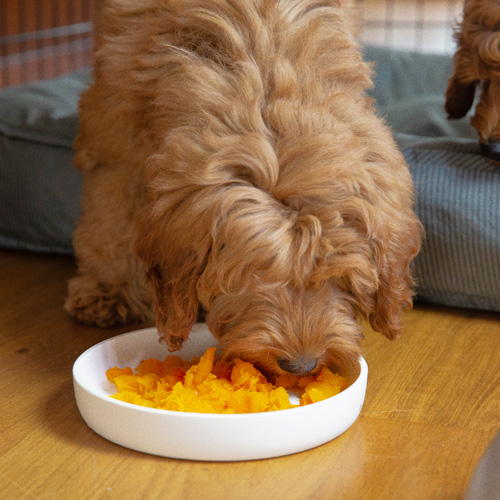
WHAT ARE PROBIOTICS FOR DOGS?
Approximate reading time: 6 minutes
Probiotics are a group of microorganisms found naturally in some foods, although they are also synthesised in commercial supplements in a variety of forms. These micro-organisms, also known as good bacteria, contribute to good gut health. And they don't just help people - dogs can take probiotics too! Just like humans, these animals have what is called gut microbiota, a huge population of bacteria of different strains that protect their digestive system from disease.
Before we go any further, you've probably also heard of prebiotics. Just as probiotics are live microorganisms that help maintain a healthy microbiota in your dog, prebiotics, which are present in food, act as nutrients for that microbiota, supporting its growth.
Would you like to know how to help your dog by offering these probiotic foods? Here we go!
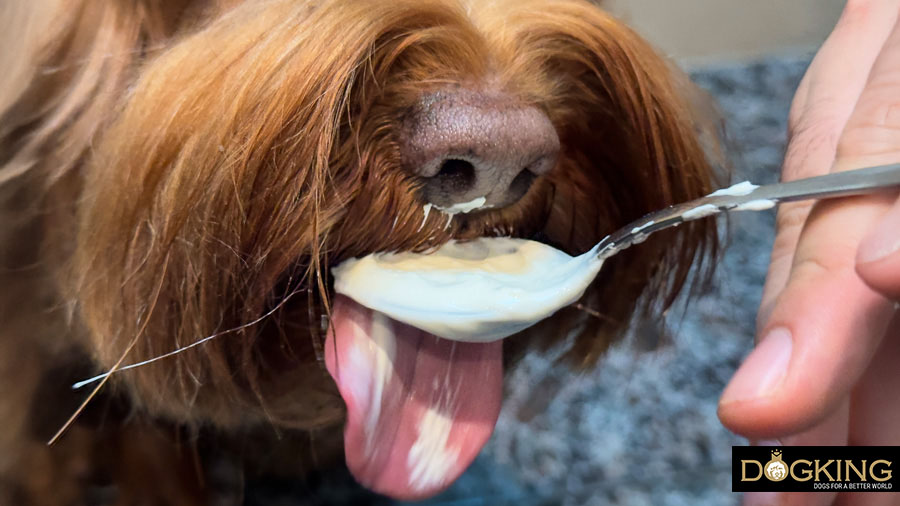
Table of contents
1- What are the benefits of probiotics in dogs?
2- When is it good for a dog to take probiotics?
3- How do I give probiotics to my dog?
4- How much probiotic food should I give my dog?
What are the benefits of probiotics in dogs?
There are different situations in which your dog's gut microbiota may be affected. For example, in episodes of stress, if he has diarrhoea (whether due to a sudden change of diet, a virus or any other reason), if he has been taking antibiotics for a long time... In all these cases, giving your dog probiotics will help him to restore his intestinal flora. Here are some of the benefits of using probiotics in dogs:
- They improve intestinal health, boosting defences and preventing digestive diseases
- Help with gastritis
- They promote the absorption of vitamins and nutrients
- They have benefits on the nervous system
- They reduce food intolerances
When is it good for a dog to take probiotics?
If your dog is healthy, he doesn't need probiotics, as his microbiota will function properly, maintaining a balance and efficiently fighting harmful bacteria and digestive diseases. However, there are certain conditions or situations where you can help your furry friend by offering probiotic foods. However, you should always consult a veterinarian. Although it is very difficult for a natural probiotic to harm your dog's organism, it is preferable for a professional to determine the dosage and duration of treatment. Here are the cases in which it is good to give probiotics to your dog.
- In episodes of stress
- If there are nutritional deficiencies
- If he has digestive problems, such as diarrhoea or vomiting
- If he has food allergies
- If he has a sensitive stomach
- After the use of antibiotics or internal deworming
How to give probiotics to my dog?
There are different presentations of probiotics for dogs on the market, in formats such as tablets, powders, yeast or enriched feed. However, in this article we will focus on the natural probiotics found in some foods. Even if they are natural foods, we recommend that you consult your vet before giving them to your pet.
-
Yoghurt
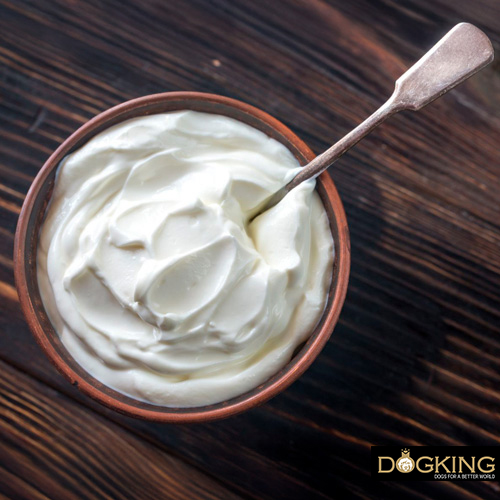
Yoghurt is a very good natural probiotic for dogs, as long as there is no intolerance. Some dogs may have varying degrees of lactose sensitivity because their small intestine does not produce enough lactase, the enzyme that breaks down lactose. This can cause your dog to suffer from vomiting, diarrhoea or abdominal bloating. So if you're going to give your dog yoghurt, give it in very small doses to start with and watch his reaction to see if there's an intolerance.
If your furry friend can safely eat dairy, yoghurt is an excellent probiotic rich in milk-fermenting micro-organisms. It is best to opt for unpasteurised yoghurt, as the micro-organisms are killed during this process, in which the product is brought to high temperatures. Always buy them in specialised shops to ensure that they are a safe, quality product. Although it is always preferable to opt for special yoghurts for dogs, if you choose to buy yoghurt in the supermarket, make sure it does not contain sugar or other additives.
-
Kefir
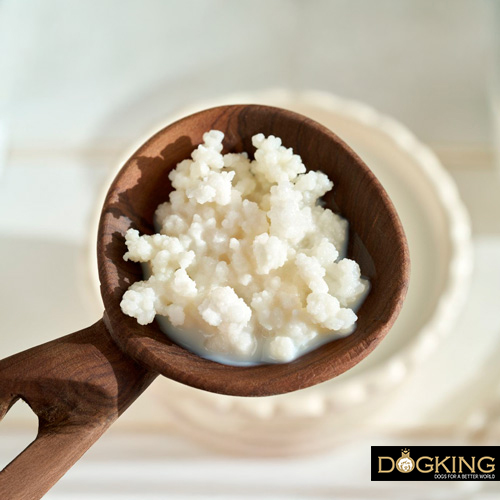
Kefir is another dairy product obtained by fermenting raw milk and, like yoghurt, contains large quantities of live micro-organisms that are very beneficial for your dog's microbiota. If your furry friend is lactose intolerant, you can always opt for water kefir, which, although not as well known, can be found in specialised shops.
-
Sauerkraut
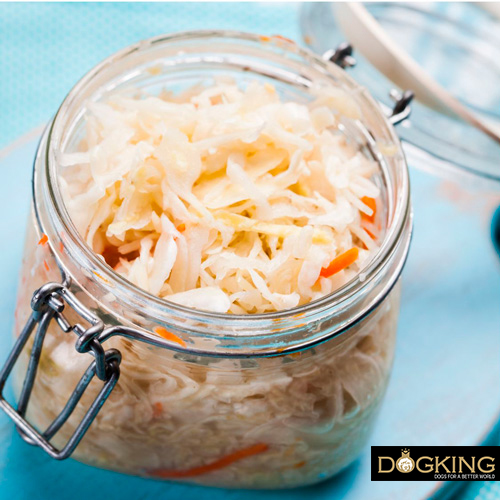
Sauerkraut is a typical Northern European dish consisting of fermented cabbage and other vegetables. It is this fermentation process that produces the micro-organisms that make this food an excellent probiotic for your dog. You can try offering him whole sauerkraut or, if he's not keen on it, mash it up and mix it with his regular food.
-
Microalgas
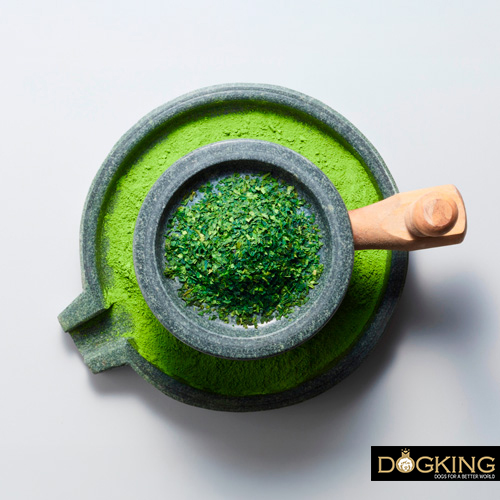
Another natural probiotic food is microalgae. These seagrasses are also rich in these beneficial micro-organisms for the canine microbiota. They can be harder to find, but specialised shops sell them in powdered form so you can add them to your dog's food.
How much probiotic food should I give my dog?
Before making any changes to your dog's diet, even if you are introducing natural foods, we advise you to ask your vet for their professional opinion. Once you are authorised to feed your dog probiotic ingredients, he or she will advise you on the most appropriate dosage. As long as your dog tolerates probiotic foods well, a higher than recommended dosage will not harm them but it is best to check with your vet for the exact dosage to get the benefit you are looking for.
In any case, whenever you add a probiotic food to your dog's diet, do so gradually, from smaller to larger amounts. In the case of yoghurt, one of the most popular probiotics, one tablespoon every two days for small dogs, two tablespoons for medium-sized dogs and three tablespoons every three days for large dogs will suffice. In any case, if you opt for a special yoghurt for dogs, which is the most advisable thing to do, the packet will indicate the necessary dosage according to weight and pathology.
In short, natural foods rich in probiotics are an excellent way to improve and protect your dog's digestive system if they suffer from problems such as diarrhoea, intolerances or is undergoing antibiotic treatment. Consult your vet for advice on how to help your furry best friend with probiotic foods.